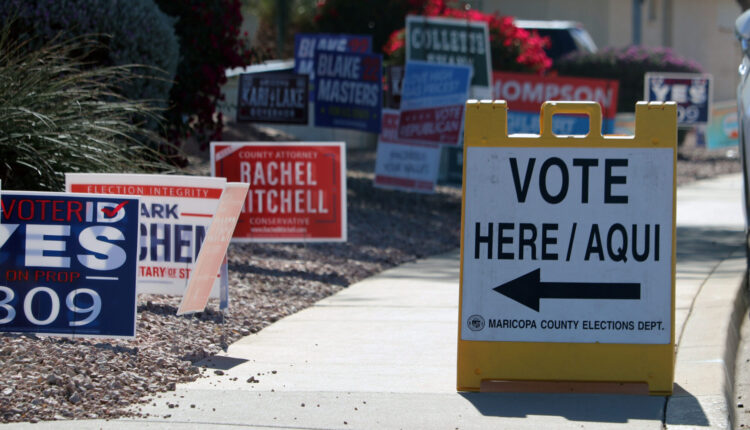Republicans want to ask voters to ban early voting, put 1,000-person cap on precincts
In an effort to bypass a veto from Democratic Gov. Katie Hobbs, Republicans want to ask voters to end early voting by mail, sharply limit early voting in person and cap precinct voting locations in Maricopa and Pima counties at 1,000 voters.
Republicans have introduced two separate bills that eliminate early voting, by far the most popular way to vote in Arizona, and to cap voting precincts at 1,000 voters. But if those pass through both chambers, Hobbs would have the power to veto them.
House Concurrent Resolution 2032 would instead go to the November ballot and ask the voters for approval, avoiding Hobbs and her veto stamp.
GET THE MORNING HEADLINES DELIVERED TO YOUR INBOX
SUBSCRIBE
Unlike the bill that would ban voting centers to be replaced by 1,000-voter precincts, the resolution would allow counties with populations of 500,000 or less to use voting centers, while it would require counties with populations of 500,000 or more — Maricopa and Pima counties are the only to fit that criteria — to use 1,000-person precincts, though they could open voting centers in addition to those.
Several Arizona counties use a vote center model, in which any registered voter in the county can cast their ballot at any polling location in the county. In a precinct model, each voter can only cast a ballot at their designated location, and if they don’t cast their ballot at the correct location, it won’t be counted.
Arizona’s most populous counties, Maricopa and Pima, both use vote centers exclusively, and Yuma and Yavapai counties have both used them for more than a decade.
Jen Marson, executive director of the Arizona Association of Counties, told lawmakers on the Senate Elections Committee that the precinct cap, even with an allowance for voting centers in addition to precinct locations, was completely unworkable.
“We just don’t have the places and the people,” Marson said at Monday’s committee hearing.
Marson has repeatedly told the Republicans that back these bills that the counties simply cannot find enough voting locations or election workers to comply with 1,000-voter precincts.
She estimated that around 2,500 precincts would be necessary in Maricopa County alone. That’s more than twice as many as the 1,100 or so the county had 20 years ago — and it was a struggle to find workers to staff them back then.
Marson said that the bill “hamstrings counties in a way that’s just untenable.”
Alan Skillicorn, a Fountain Hills City Council member, was the only member of the public who spoke in favor of the bill during the committee meeting.
He pointed to conspiracy theories about the 2022 election in Maricopa County as proof of voter suppression, saying that long lines and tabulator problems caused people to go home without voting. But those are some of the claims that were thrown out of court in Kari Lake’s challenge to the results of the 2022 election.
The resolution would also ask voters to ban no-excuse early voting, an extremely popular way to vote in Arizona that has been used by 75-90% of voters in the last several elections. Republicans ushered in no-excuse early voting in 1991 and it became increasingly more popular after that, until former President Donald Trump began spreading conspiracy theories about vote-by-mail fraud after he lost the 2020 election.
Sandy Bahr, the director of the Sierra Club’s Grand Canyon Chapter, told lawmakers that she got involved in encouraging voting when she first moved to Arizona, before no-excuse early voting was implemented, when voter turnout was low. Turnout increased significantly after its implementation, she said.
“Why would you want to do anything at all to discourage voting?” she asked.
Bahr added that she is confident that voters will reject the measure if it makes it to the ballot, but she still encouraged them to save the trouble and vote it down in committee.
While Skillicorn argued that capping precincts at 1,000 voters would make for shorter lines, Sen. Priya Sundareshan, D-Tucson, argued that banning the way that the vast majority of Arizonans vote, even with small precincts, would do the exact opposite.
A huge influx of people casting ballots at the polls on Election Day would not make things easier, she said.
Sen. Sonny Borrelli, R-Lake Havasu City, said he thinks the bill is a great way to encourage more people to volunteer as election workers.
“To assume that the counties don’t have the logistical expertise, I find extremely insulting,” he said, ignoring Marson’s statements on behalf of the counties.
Kerry Jackson, who said he’d worked as an election observer at precinct locations, voting centers, at the Runbeck facility run by Maricopa County’s elections contractor and at the Maricopa County Elections and Tabulation Center.
He compared those who believe that fraudulent ballots could be inserted into the system to people who don’t believe that man landed on the moon.
“They listened to the stories about the (election fraud) court cases but not about cases being denied,” Jackson said.
Prior to the committee’s vote on the resolution, former secretary of state Sen. Ken Bennett, R-Prescott, who had voted against the 1,000-voter precinct bill in committee, left the Elections Committee hearing to speak about bills he had sponsored that were being considered by committees in the House of Representatives. Sundareshan asked if the Elections Committee could wait for his return to vote on the resolution, but committee Chairwoman Wendy Rogers, R-Flagstaff, denied her request.
“I think this is overdue and the voters want it,” Rogers said.
The Elections Committee voted 4-3 to pass the resolutions, with only Republicans in favor. It will next head to the full Senate for consideration.



Comments are closed.